With Washington sliding out of the playoff race over the last two months, attention turned to Alex Ovechkin and his pursuit of the all-time goals record. He won't reach it this year, and almost certainly not next year, either, but the chase is part of the fun. That chase may have come to an end for this season as Ovechkin (and TJ Oshie) were out of the lineup against for the Capitals on Monday night with the team hosting the New York Islanders. Ovechkin is sitting at 42 goals on the year and the Caps have two games left, one on Tuesday night and one on Thursday.
The Islanders lost a key game 5-2 in Washington, even as the Capitals continue to play without Alex Ovechkin and TJ Oshie. Dylan Strome scored twice while Tom Wilson added a goal and an assist. Wilson also had three total shots, a block, four PIMs, and five hits in a vintage fantasy effort. The two goals give Strome a career-high of 23 on the season.
New York has one game left, Wednesday night at home to Montreal. Darcy Kuemper saved 38 of 40 shots in a fantastic effort.
*
Marco Rossi was called up by Minnesota on Monday and he played Monday night, slotting on the third line with Nic Petan and Ryan Hartman as the team rested a bunch of regulars. Rossi had 50 points in 51 AHL games this season as he tried to get his development on track following his bout with serious COVID problems. He played 16 games earlier in the season with the big club but managed just one point. A nice finish to the season here could mean he at least gets considered for playoff games.
Brock Faber also lined up for the Wild on Monday night after signing with the team over the weekend.
*
Don't forget to head to the Dobber Shop to grab your copy of the 2023 Interactive Playoff Draft List!
*
Lukas Reichel was demoted back to the AHL:
If this is the end of his NHL season, he managed 15 points in 22 games in calendar 2023, showing well enough on a team that was trying to make itself as bad as possible. Not that cap hits will matter for Chicago for a while, but 2023-24 will be Reichel's final year on his entry-level contract as they burned his first year last season, making 2022-23 Year 2. He has one year left before hitting RFA status and he has 34 NHL games under his belt.
*
Tampa Bay said Tanner Jeannot will be out at least for the start of the postseason:
The team said they hope he can be back by the end of the first round, but it sounds like they're trying to be optimistic. Something to keep in mind for those doing their playoff pools.
*
Mason Marchment is going to be on the road with Dallas this week:
This makes it sound like he should return before the end of the regular season, meaning he's fine for playoff drafts (in as far as Dallas is an appealing target for playoff fantasy drafts).
*
Mark Stone was back at Vegas practice in a non-contact jersey:
Stone had back surgery in January, having played just 43 games this season. He still has a couple steps left to go before returning to the lineup, namely taking contact, so nothing is imminent, and the team reiterated that there is no timeline for Stone’s return. Being back in practice, though, is certainly a step in the right direction.
*
New Jersey said prospect Luke Hughes will get at least one regular season game in:
We shouldn't expect it, but it would be pretty neat to see two of the Hughes brothers line up together in the playoffs.
*
Matthew Knies played his first game for Toronto, lining up on the third line for their game against Florida on Monday night. It seems the team’s top-6 forward mix is set, but we’ll see how things go over the next 10 days.
John Tavares grabbed a loose puck in the neutral zone and raced down on Alex Lyon, scoring the overtime winner for Toronto, lifting the Leafs to a 2-1 victory. Auston Matthews also scored for Toronto, his 40th of the season. It is hard to imagine that a 40-goal, 85-point season is a bad year for Matthews but those are the expectations now.
Ilya Samsonov saved 45 of 46 shots he faced to hold down the net for Toronto.
Carter Verhaeghe assisted on Brandon Montour's goal, giving him 31 assists on the year, tying his career-high set a year ago.
I thought Knies played well enough for his first NHL game, and didn’t do anything to stand out in a negative way outside of one blue-line turnover.
*
In a push for first in the Central Division, Dallas laid a beatdown on Detroit by a 6-1 margin. The top line did a lot of the damage as Roope Hintz (1+3) and Jason Robertson (1+2) each had multi-point efforts, while Joe Pavelski scored his 27th of the season. That goal doubled as Pavelski's 1000th point of his career, which is impressive considering he didn't even have 70 points by his age-24 season. The four points for Hintz give him a career-high 74 in just 71 games, and he needs one more goal to tie his mark of 37 from the 2021-22 season.
Miro Heiskanen had a pair of assists, one on the power play, and that gives him his first 70-point season. In fact, one more point and he'll double his career-high of 36 from a year ago.
*
Winnipeg did the job at home, getting a huge two points in their 6-2 win over San Jose. Josh Morrissey (1+2), Mark Scheifele (1+1), Kyle Connor (1+1), Adam Lowry (1+1), Mason Appleton (1+1), and Dylan DeMelo all had multi-point games. Morrissey had three total shots, a block, and a hit in a very good fantasy night near the end of an excellent fantasy season. Connor's two points put him over 80 points for the second time in as many seasons.
Erik Karlsson scored both San Jose goals, and he is now up to 25 goals and 100 points on the season. It is the first 100-point season from a defenceman in over 30 years. He still leads the league in 5-on-5 points (among all players, not just defencemen) in one of the most incredible seasons in recent memory.
*
Ottawa's top line all had multi-point games in the team's 3-2 win over Carolina. Brady Tkachuk (0+2), Tim Stützle (1+1), and Claude Giroux (2+1) were tremendous, as they have been for much of this season. Tkachuk had five shots, two penalty minutes, and a hit in a great fantasy night. He now has 82 points on the season, guaranteeing him a point-per-game season.
Martin Necas had two assists as well, giving him 71 points on the year, and his first 70-point season. His rebound season came in a big, big way for Carolina.
*
The term 'market share' might be familiar to anyone who follows television ratings or the business world, but for fantasy sports, and hockey in particular, it also has use. For our purposes, market share is what percentage of a team's shots or expected goals that occur with a given player on the ice are attributed to that player. For example, if Minnesota generates 100 expected goals (xG) when Kirill Kaprizov is on the ice in a full season, and 30 of those expected goals come off Kaprizov's stick, his xG market share is 30%. If Anaheim generates 1000 shot attempts (CF) with Derek Grant on the ice in a full season, and 250 of them are taken by Grant himself, his CF market share is 25%. For now, we're going to look at forwards only but my recent spate of Ramblings covering defencemen will lead me to get to that position this week. Stats are as of the morning of Saturday, April 8th.
There is a reason why we're looking at both shot attempts and expected goals, and it's we're trying to measure different things with the two of them. Let's talk about that before getting to the players.
Shot attempts indicate any attempt towards the goal, and all are weighed equally. That means a Vince Dunn wrist shot from just inside the blue line that sails a foot over the net is worth the same as a Brady Tkachuk rebound goal from the top of the crease. That binary nature – it is an attempt towards the net, or it is not – gives us an indication of players that are trying to score (or not) as often as they can. That can be good because it helps find goal scorers, particularly on bad teams, but it can lead us astray as players taking a disproportionately high number of poor shots often leads to low goal production. However, it can point us in the direction of guys trying to constantly score (or not), and then investigate further.
Conversely, expected goals, which is an attempt to quantify the quality of the shot being taken, show us something else. Players are more likely to score the closer to the net they are. It is something that makes intuitive sense, but that is what drives a large portion of expected goals: proximity to the goal. A rebound shot from the top of the crease is better than a snap shot from the right point. And what is why xG market share measures something else. While it does show players trying to score, it is also a proxy for physicality, and that's something else that makes intuitive sense once it is described. In short, players that have high xG market shares, an indication that they're getting close to the net often, are more physical, and that means lots of hits. In a sense, not only are we finding potential goal scorers, but ones that can manage good hit totals as well, and that physicality is always important in multi-cat fantasy formats.
Once the season has finished, and stats are finalized for players, we're going to talk about market share and its various iterations at length. For now, I want to focus on the xG market share component for this season and last, why it's important, and how to use that information this summer when rebuilding keeper/dynasty teams, or starting new ones.
So, as mentioned earlier, players with high xG market shares tend to have high (or higher) hit rates than their opposites. Let's look at the numbers.
In the 2021-22 season, per Evolving Hockey, there were 318 forwards that skated at least 800 minutes at all strengths. For a frame of reference, here are the top-10 by xG market share in that list:
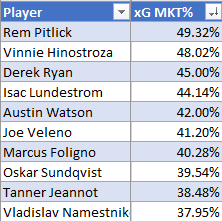
Readers will notice there is no one that stands out. There are some guys that have had good fantasy seasons before, but not necessarily any star-calibre mainstays.
The 318 forwards in this sample produced a rate of 4.41 hits per 60 minutes, giving us roughly our league average. To be one standard deviation above (or below) that hit rate, a player would need to be either in the top-50 (or bottom-50) of the forwards in our sample. This is where things get interesting:
- The top 50 forwards by xG market share averaged 5.84 hits per 60 minutes, which is 32% higher than the league average. These guys averaged 113.4 hits every 82 games.
- The bottom 50 forwards by xG market share averaged 3.25 hits per 60 minutes, and that is roughly 36% worse than league average. These guys averaged roughly 77.4 hits every 82 games.
Again, the guys at the top weren't all elite performers, but 12 of the top-50 by xG market share finished the 2021-22 season with at least 20 goals, and those 12 guys averaged 107 hits on the season. Some are notable names like Brock Nelson and Nick Schmaltz, but most aren't heralded. Regardless, if this can help point us to guys that can post 20-goal, 40-point, 100-hit seasons, it's worth a look.
Looking at 2022-23, we have 281 forwards that have reached 800 total minutes played, and they averaged 4.02 hits per 60 minutes (yes, hits are going down again). To be a standard deviation above or below that mark, a player would need to be in the top (or bottom) 44 forwards in hits/60. Here is what happened:
- The top 44 in xG market share averaged 5.33 hits/60, which is 33% higher than the league average.
- The bottom 44 in xG market share averaged 2.54 hits/60, which is 37% lower than the league average.
Once again, the guys that lead in market share tend to hit a lot more than the guys at the opposite end of the spectrum. This year, we had 19 of those 44 players reach at least 20 goals. As players and teams focus more on shot quality than shot quantity, it makes sense we have more goal scorers in this regard, but it still serves the same function: highlighting players that can score and hit, which is something that can bring a lot of value in multi-cat fantasy leagues.
Just for a frame of reference, here are the top-10 forwards by xG market share in 2022-23:
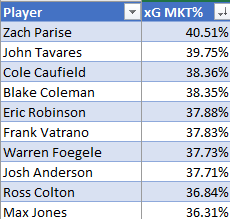
Not all big hitters, but some very notable names, and useful fantasy options besides that. Let's quickly review some of the top xG market share guys that maybe don't get a lot of press.
He may not post huge totals, but Foegele has already posted his fifth straight season with at least 10 goals and his last three 82-game seasons have seen him post at least 10 goals, 25 points, and 60 hits. Not bad for a guy that has averaged 13 minutes a game for his career. He has averaged 14 goals, 15 assists, 148 shots, and 125 hits every 82 games in Edmonton. He is knocking on the door of sustained fantasy success, though I'm not sure he has the raw finishing ability to regularly threaten 25-goal seasons, even if he skated 16 minutes a game.
Here we have another player that has had a problem finishing in his career. Jones has surpassed the 200-game mark for his NHL journey and is shooting 7.2%, a number that is just slightly higher when looking at 2022-23 alone. If he could shoot around 10-11%, he can start posting numbers like Foegele has, and that includes even more hits. Anaheim is still going through its rebuild but there are enough quality forwards to keep Jones's ice time meagre.
Time may be running out for Kiviranta to prove himself for Dallas. The team is seeing its young prospects start to flourish, its veterans are all under contract, and that doesn't include more additions they can make in the future. He does have a career-high seven goals in 2022-23, but his defence-first role keeps his shot totals low, even for someone who plays as little as he does. Unless he can change his offensive profile, fantasy value will be scant.
Dakota Joshua
Here we have another player that does not shoot much, even for his low ice time levels, but he certainly makes up for it elsewhere. His offensive metrics are good this season, as his playmaking has helped his teammates (and him) create when he's on the ice. He also had 211 hits through 75 games to go with his 11 goals. There appears to be something here with Joshua, though Vancouver does have a lot of forwards that can play ahead of him on the depth chart. He is a name to keep in mind when training camps roll around in September.
Over the last two seasons, Rasmussen has scored at a second-line rate on a per-60 basis, as his 0.74 goals per 60 tie him with names like Logan Couture and Mike Hoffman. He averaged north of two hits per game in 2022-23 as he skated a career-best 15:05. Rasmussen had a very strong season at both ends for the Wings before the knee injury ended his season. If he can play that floater middle-6 role again in 2023-24, this could be a 20-goal, 45-point, 160-hit forward. That will play in multi-cat formats.
We will talk a lot about market share through the summer, but I thought it'd be good to highlight why some components can be very important, and some players to keep an eye on.

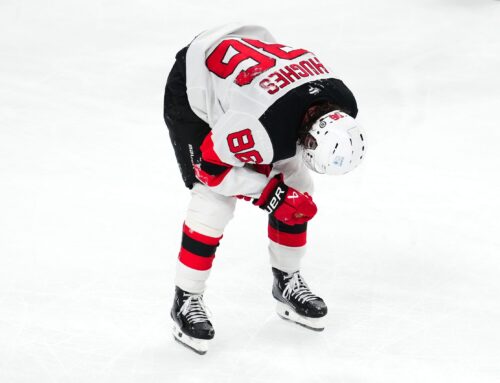
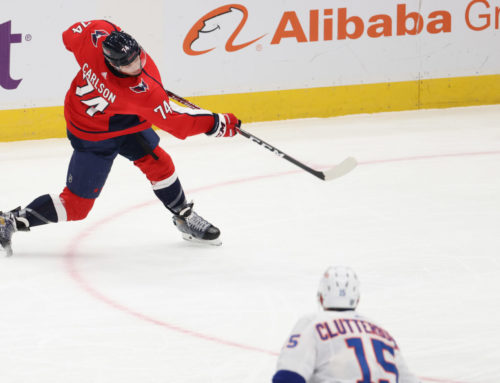
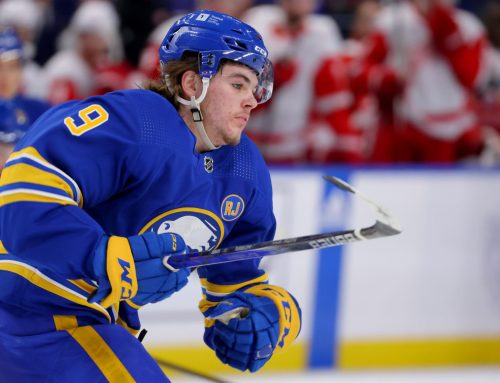
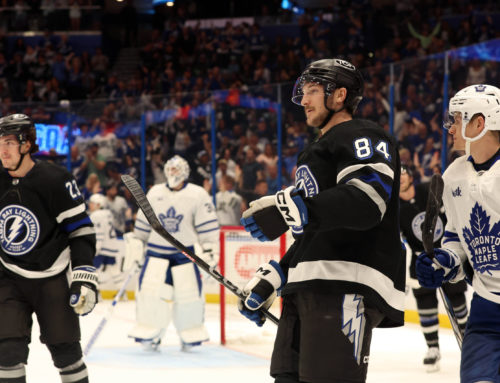
 TOR
TOR S.J
S.J ANA
ANA EDM
EDM CAR
CAR DET
DET CGY
CGY VAN
VAN BOS
BOS CHI
CHI
